 |
|
|
¡Qué hay de nuevo!
Corte Interamericana de Derechos Humanos
Área de Gestión de Información y Conocimiento
Boletín No. 362 Año 13, 2020 |
|
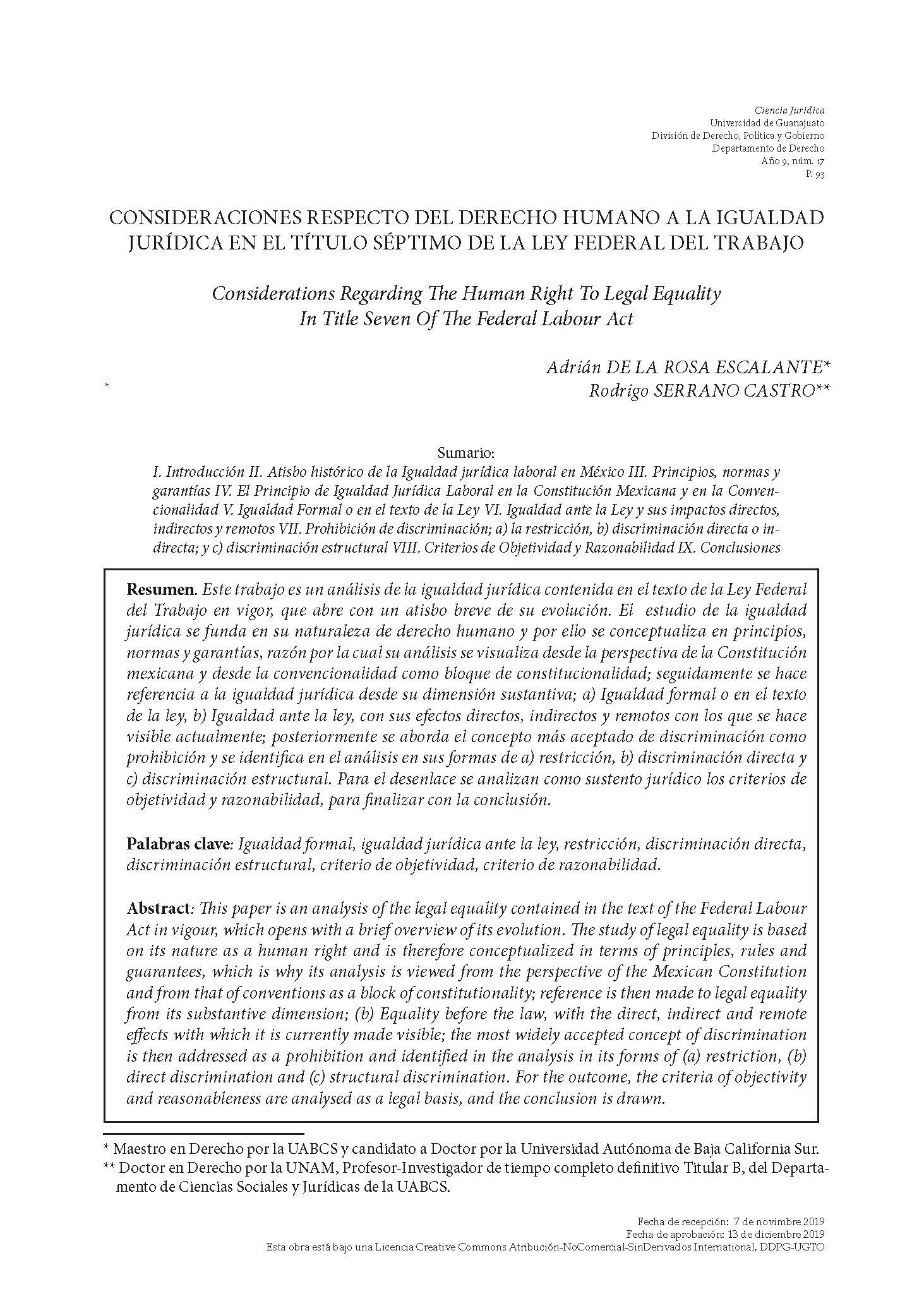 |
Consideraciones respecto del derecho humano a la igualdad jurídica en el título séptimo de la Ley Federal Del Trabajo
Adrián de la Rosa Escalante y Rodrigo Serrano Castro
En: Ciencia jurídica
Vol. 9, No. 17 (2020)
Este trabajo es un análisis de la igualdad jurídica contenida en el texto de la Ley Federal del Trabajo en vigor, que abre con un atisbo breve de su evolución. El estudio de la igualdad jurídica se funda en su naturaleza de derecho humano y por ello se conceptualiza en principios, normas y garantías, razón por la cual su análisis se visualiza desde la perspectiva de la Constitución mexicana y desde la convencionalidad como bloque de constitucionalidad; seguidamente se hace referencia a la igualdad jurídica desde su dimensión sustantiva; a) Igualdad formal o en el texto de la ley, b) Igualdad ante la ley, con sus efectos directos, indirectos y remotos con los que se hace visible actualmente; posteriormente se aborda el concepto más aceptado de discriminación como prohibición y se identifica en el análisis en sus formas de a) restricción, b) discriminación directa y c) discriminación estructural. Para el desenlace se analizan como sustento jurídico los criterios de objetividad y razonabilidad, para finalizar con la conclusión. |
|
|
|
|
|
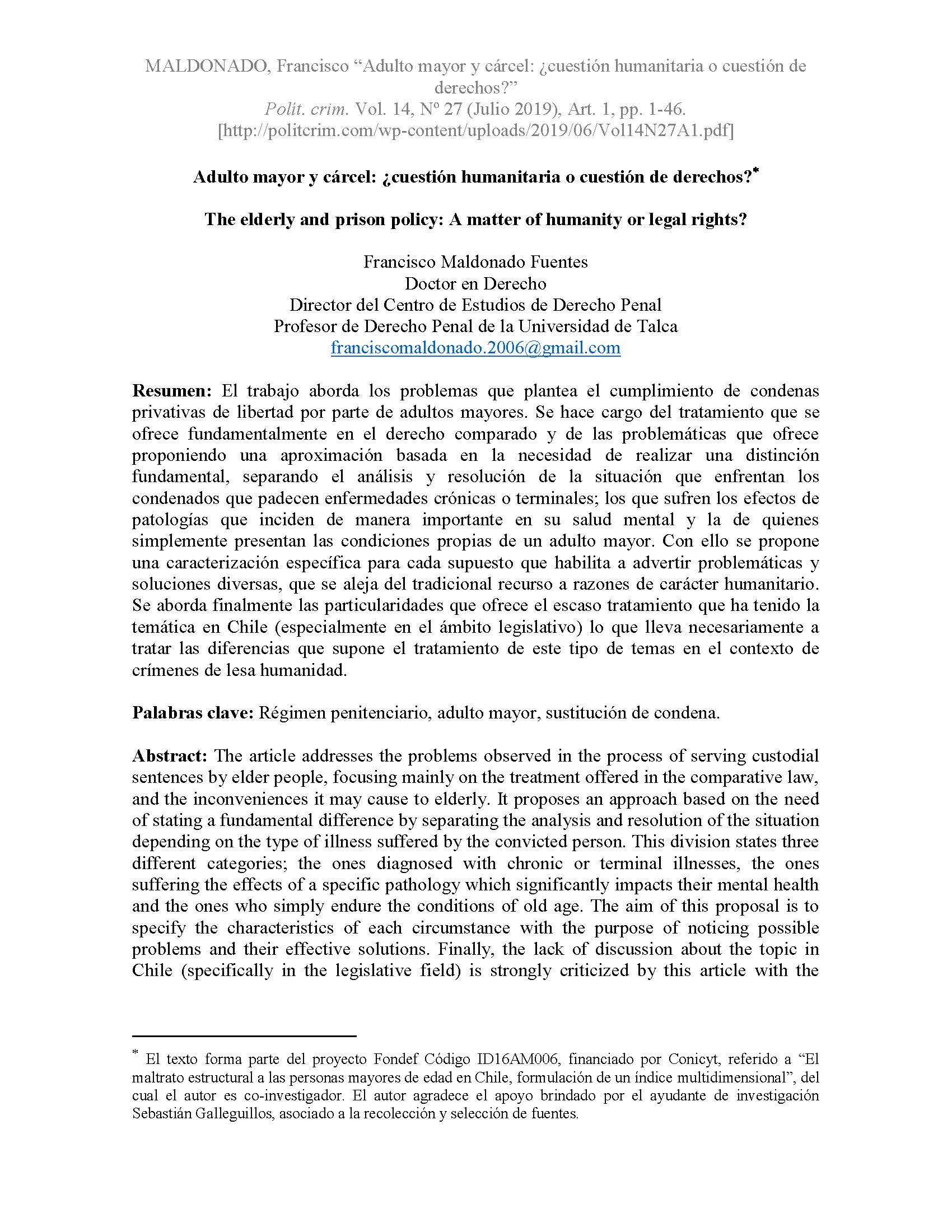 |
Adulto mayor y cárcel: ¿Cuestión humanitaria o cuestión de derechos?
Francisco Maldonado Fuentes
En: Política Criminal
Vol. 14, No. 27 (2019)
El trabajo aborda los problemas que plantea el cumplimiento de condenas privativas de libertad por parte de adultos mayores. Se hace cargo del tratamiento que se ofrece fundamentalmente en el derecho comparado y de las problemáticas que ofrece proponiendo una aproximación basada en la necesidad de realizar una distinción fundamental, separando el análisis y resolución de la situación que enfrentan los condenados que padecen enfermedades crónicas o terminales; los que sufren los efectos de patologías que inciden de manera importante en su salud mental y la de quienes simplemente presentan las condiciones propias de un adulto mayor. Con ello se propone una caracterización específica para cada supuesto que habilita a advertir problemáticas y soluciones diversas, que se aleja del tradicional recurso a razones de carácter humanitario. Se aborda finalmente las particularidades que ofrece el escaso tratamiento que ha tenido la temática en Chile (especialmente en el ámbito legislativo) lo que lleva necesariamente a tratar las diferencias que supone el tratamiento de este tipo de temas en el contexto de crímenes de lesa humanidad. |
|
|
|
|
|
Credibilidad de los solicitantes de asilo y estereotipos heterosexistas: En busca del refugiado LGBTI por antonomasia
Francisco de Asís Peña Díaz
En: Cuadernos Electrónicos de Filosofía del Derecho
Núm. 39 (2019)
Aunque ni los principales instrumentos de Derechos Humanos (con la Declaración de 1948 a la cabeza) ni del Derecho de los Refugiados mencionan a las personas LGBTI, a lo largo de las últimas décadas han sido interpretadas para extender su protección a los refugiados por razones de orientación sexual o identidad de género. Sin embargo, con frecuencia se han encontrado con un importante obstáculo que les dificulta acceder a la protección internacional: la pervivencia de estereotipos y prejuicios sobre el género, el comportamiento o la sexualidad que minan la credibilidad de su testimonio. En este trabajo se evalúan los más habituales y cómo han sido tratados en la jurisprudencia del Tribunal de Justicia de la UE. |
|
|
|
|
|
The Theorized Relationship between Organizational (Non)Compliance with the United Nations Guiding Principles on Human Rights and Desired Employee Workplace Outcomes
Magda B. L. Donia, Salvador Herencia Carrasco, Sara Seck, Robert McCorquodale and Sigalit Ronen
En: Journal Sustainability
Vol. 12, No. 5 (2020)
Reparations for war victims are attributed many positive effects such as the communication of acknowledgement and people's entitlement to rights. This article argues that the impact that reparations have relies on victims' perceptions of the respective program, which is influenced in turn not only by its design, but also by its implementation. A framework for assessing the establishment of reparations programs is introduced and applied to the case of Sierra Leone. As interviews with beneficiaries reveal, its problematic implementation exacerbated existing problems in the program's design and intensified a negative demonstration effect concerning neglect on behalf of the state. |
|
|
|
|
|
Privatization and Economic and Social Rights
Aoife Nolan
En:Human Rights Quarterly
Vol. 40, No. 4 (2018)
Privatization is an ever more dominant model of economic and social rights (ESR) realization. Thus far, however, there has been relatively little attention paid to privatization in ESR scholarship and practice, resulting in a significant lacuna from both a normative and an empirical perspective. Taking as its starting point the delineation of ESR obligations in terms of the tripartite typology of respect, protect, and fulfill, this article critiques how that framework (and the treaty bodies which employ it in their work) addresses privatization from an ESR perspective. The author outlines a new approach—focused on the obligation to fulfill—which would contribute significantly to the ability of ESR law as it stands to capture and address the scope of state decision-making and (in)action at issue in privatization situations. |
|
|
|
|
|
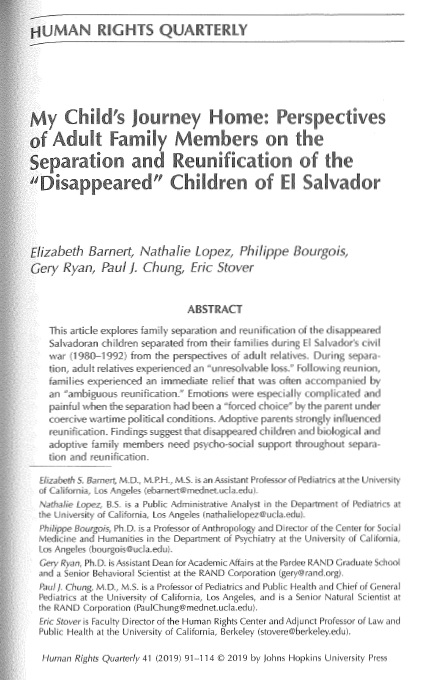 |
My Child’s Journey Home: Perspectives of Adult Family Members on the Separation and Reunification of the “Disappeared” Children of El Salvador
Elizabeth Barnert, Nathalie Lopez, Philippe Bourgois, Gery Ryan, Paul J. Chung and Eric Stover
En: Human Rights Quarterly
Vol. 41, No. 1 (2019)
This article explores family separation and reunification of the disappeared Salvadoran children separated from their families during El Salvador’s civil war (1980–1992) from the perspectives of adult relatives. During separation, adult relatives experienced an “unresolvable loss.” Following reunion, families experienced an immediate relief that was often accompanied by an “ambiguous reunification.” Emotions were especially complicated and painful when the separation had been a “forced choice” by the parent under coercive wartime political conditions. Adoptive parents strongly influenced reunification. Findings suggest that disappeared children and biological and adoptive family members need psycho-social support throughout separation and reunification. |
|
|
|
|
|
|
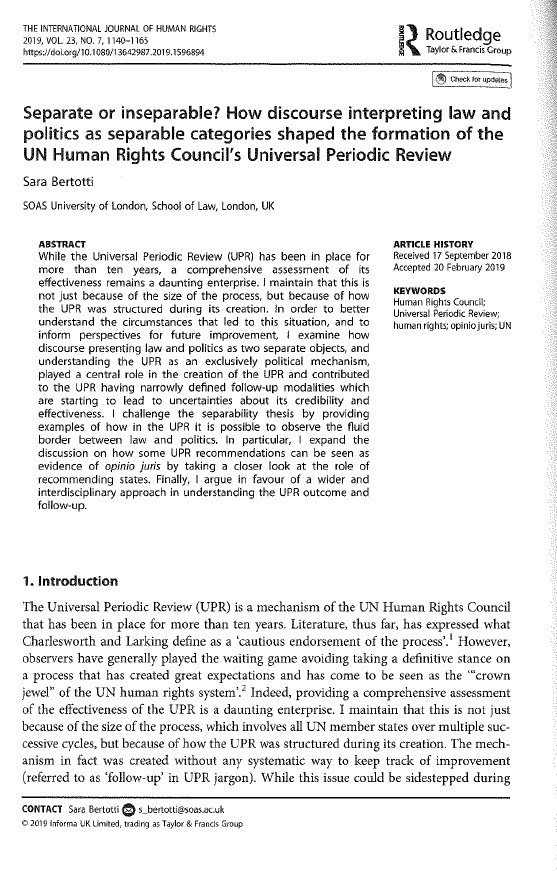 |
Separate or inseparable? How discourse interpreting law and politics as separable categories shaped the formation of the UN Human Rights Council's Universal Periodic Review
Sara Bertotti
En: The International Journal of Human Rights
Vol. 23, No. 7 (2019)
While the Universal Periodic Review (UPR) has been in place for more than ten years, a comprehensive assessment of its effectiveness remains a daunting enterprise. I maintain that this is not just because of the size of the process, but because of how the UPR was structured during its creation. In order to better understand the circumstances that led to this situation, and to inform perspectives for future improvement, I examine how discourse presenting law and politics as two separate objects, and understanding the UPR as an exclusively political mechanism, played a central role in the creation of the UPR and contributed to the UPR having narrowly defined follow-up modalities which are starting to lead to uncertainties about its credibility and effectiveness. I challenge the separability thesis by providing examples of how in the UPR it is possible to observe the fluid border between law and politics. In particular, I expand the discussion on how some UPR recommendations can be seen as evidence of opinio juris by taking a closer look at the role of recommending states. Finally, I argue in favour of a wider and interdisciplinary approach in understanding the UPR outcome and follow-up. |
|
|
|
|
|
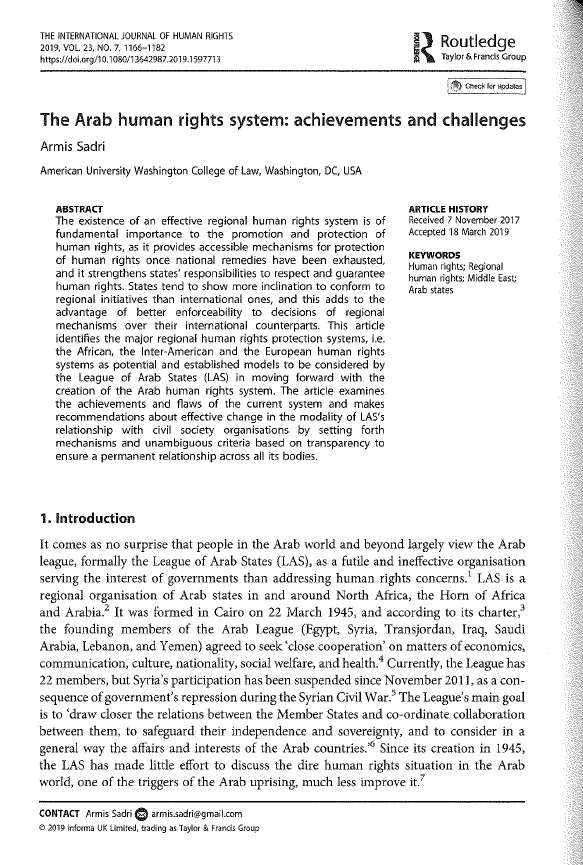 |
The Arab human rights system: Achievements and challenges
Armis Sadri
En: The International Journal of Human Rights
Vol. 23, No. 7 (2019)
The existence of an effective regional human rights system is of fundamental importance to the promotion and protection of human rights, as it provides accessible mechanisms for protection of human rights once national remedies have been exhausted, and it strengthens states’ responsibilities to respect and guarantee human rights. States tend to show more inclination to conform to regional initiatives than international ones, and this adds to the advantage of better enforceability to decisions of regional mechanisms over their international counterparts. This article identifies the major regional human rights protection systems, i.e. the African, the Inter-American and the European human rights systems as potential and established models to be considered by the League of Arab States (LAS) in moving forward with the creation of the Arab human rights system. The article examines the achievements and flaws of the current system and makes recommendations about effective change in the modality of LAS’s relationship with civil society organisations by setting forth mechanisms and unambiguous criteria based on transparency to ensure a permanent relationship across all its bodies. |
|
|
|
|
|
|